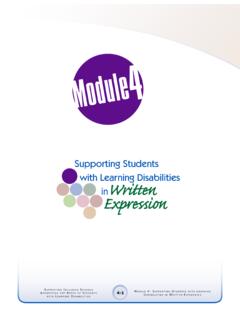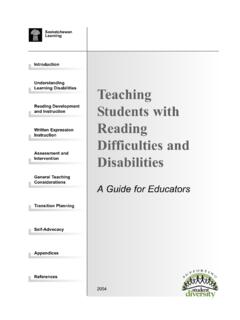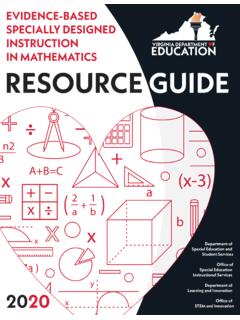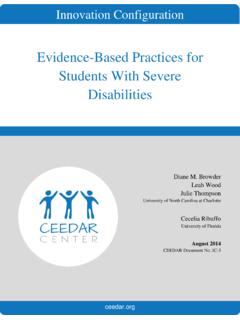Transcription of Parental Role and Support for Online Learning of Students ...
1 Parental Role and Support for Online Learningof Students With disabilities : A ParadigmShiftSean J. Smith, University of Kansas, Lawrence, KansasPaula J. Burdette, , San Francisco, CaliforniaGregory A. Cheatham, University of Kansas, Lawrence,KansasSusan P. Harvey, University of Kansas, Lawrence, study, conducted by researchers at the Center on Online Learning and Students With disabilities ,investigated parent perceptions and experiences regarding fully Online Learning for their children suggest that with the growth in K 12 fully Online Learning experiences, the parent (or adultmember) in Students households takes on added responsibilities for the child with disabilities toparticipate in schooling.
2 In particular, parents take on the role of teacher. On the basis of this new teacherrole comes a greater need for increased parent teacher communication regarding their children s learningas well as greater parent time commitments. In addition, parents discussed several barriers to their abilityto participate in their children s fully Online Learning of this study point to ways in which school administrators and Online Learning vendors canbetter Support both parents and Students with disabilities : clarify parent and teacher roles; understand theessential attributes needed for success in a fully Online environment; realize the demands placed uponparents and their children with disabilities , including the need for frequent home-school communication.
3 And require training to ensure that parents have skills needed to participate in their children s educationvia this Online participation in the education of studentswith disabilities has links to democratic societyand is a core principle of the Individuals withDisabilities Education Act Parent Participation, 34 (2004) (Turnbull, Stowe, & Huerta, 2007).As such, Turnbull, Turnbull, Erwin, Soodak, andShogren (2015) note that parent participation meansthat parents and Students with disabilities partnerwith educators in decision making about Students education (34 ) and results in benefitsfor Students , parents, and educators. Despite thesemandates and advantages, meaningful parentparticipation can be elusive.
4 Many parents remainunsatisfied with their ability to participate in decisionmaking in their children s traditionalbrick-and-mortar special education programs( , Fish, 2006; Hess, Molina, & Kozleski, 2006;Reiman, Beck, Coppola, & Engiles, 2010).In addition, some parents of Students withdisabilities are unhappy with their children seducation in traditional brick-and-mortar parents continue to have concerns about thequality of education for their children with disabilities (Hess et al., 2006). Indeed, though supports forstudents with disabilities in traditional brick-and-mortar schools have increased, some special educationprograms struggle to provide appropriate services forstudents within inclusive settings.
5 Special educationThe contents of this article were developed under a grant from the Department of Education No. H327U110011. However, those contents do notnecessarily represent the policy of the Department of Education, and you should not assume endorsement by the Federal Government. Project Officer,Celia of Special Education Leadership 29(2)NSeptember 2016101administrators and teachers point to lack of resources,inadequate teacher training, and inappropriate classsize (Pugach, 2005; Wolery & Odom, 2000;Young, 2008).In the past, Students with disabilities could onlyattend traditional brick-and-mortar K 12 recently, Students both with and withoutdisabilities have been increasingly provided withoptions for Online Learning .
6 Online schools mayprovide an educational alternative for many childrenwith disabilities whose parents may be unsatisfiedwith brick-and-mortar schools. Recent reports indicatenearly five million Students are currently enrolled inonline K 12 coursework, with an ever-increasingamount selecting a fully Online experience (outside ofthe brick-and-mortar environment). Werrell s (2014)findings suggest that the majority of fully Online orvirtual school placement decisions are made byparents who have determined that the traditionalschool is no longer meeting the needs of their child. Ifthis trend continues, and some estimates suggest thatby 2019 more than half of all K 12 Students will beenrolled in some form of blended or fully onlinelearning, the K 12 Online Learning experience willbecome more of the norm for all Students , includingthose with identified disabilities and thus affect thelearners, their parents, and the educational leaders andinstructors who work to Support these s (2014)
7 Findings suggest that the majority offully Online or virtual school placement decisions aremade by parents who have determined that thetraditional school is no longer meeting the needs oftheir 12 Online Learning comes in multiple formats,with blended Learning being the most , Horn, and Staker (2013) defineblendedlearningas a K 12 experience where Students learnpartly through Online content, controlling portions oftheir pace with digital materials as well as the time ittakes, and the path they take in order to meet anexpected outcome. Although blended Learning is amixture of face-to-face and Online instruction, themodel is more complex, allowing for variations in howthe Online material is offered, where, by whom, and towhat 1offers an overview of thevariations of the blended Learning Online Learning at the K 12 level is a virtualexperience that takes place entirely Online and awayfrom the brick-and-mortar school, almost alwayswithin the home environment, with parents or adultmembers of the extended family engaged at somelevel of Support .
8 The role of the adult family member,often the parent, is so vital that an increasing amountof fully Online K 12 schools are identifying specificroles for the parent. For example, the termlearningcoachis a common label that often comes withexpected roles and responsibilities on the part of theparent or adult family in the home where the K 12fully Online is taking et al. (2015) discussed several roles forparents of Students with disabilities . Of note, whereasmany parents struggle with being assigned the role orbeing the recipient of educators decisions ( , parentsare provided few opportunities to influence theirchildren s education), other parents assume the role oftheir children s teacher. As their children sat-hometeachers, these parents can manage severalresponsibilities traditionally assigned to the teacher,such as implementing instruction.
9 However, as Turnbulland colleagues noted, many parents are not equipped totake a teaching role due to lack of training, time, andFigure of blended Online Role and Support for Online Learning of Students With DisabilitiesJournal of Special Education Leadership 29(2)NSeptember 2016102other constraints. Moreover, a parent-as-teacher role cannegatively affect parent child dynamics, leading tofrustration for parent and child. With the current focuson meaningful participation and true parent-educatorpartnerships, Parental roles may vastly expand,particularly in Online the needs of Students with disabilities andtheir parents in traditional brick-and-mortar schools,little research describes parent participation to bestsupport Online Learning for K 12 Students .
10 The researchthat does exist targets typically developing high schoolstudents enrolled in fully Online programs. Forexample, Liu and colleagues considered a parentinvolvement model and its application to virtualschooling (Liu, Black, Algina, Cavanaugh, & Dawson,2010). Their analysis offers high correlation among fourfactors associated with parents involvement in theirchild s Learning : Parental encouragement, modeling,reinforcement, and Parental instruction. The validationof the Parental involvement measurement, specific tovirtual Learning , indicates Support for positiveinteraction between the parent and the Online teacherand school community. Likewise, Borup, Stevens, andWaters (2015) investigation of Parental engagement inonline high school instruction found parents workingwith the child to help develop perseverance, locus ofcontrol, organizational and time management skills,and overall Parental guidance through Online learningactivities.

















